We were one hour from Seville when the program director walked up and down the aisles of the train, handing out index cards to each of us.
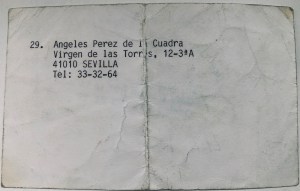
“You will be living with a married couple with a student daughter,” he said to me. I took the index card and wondered what my Spanish “family” would be like. These were the people I would be living with during my study abroad program in southern Spain in the spring of my junior year of college.
I had arrived in Spain three days earlier and was trying to keep my anxiety at bay. I was tired from the journey from New York to Madrid, trying to adjust to the time difference, and overwhelmed by the prospect of living on my own for four months with a family I had never met. I also didn’t speak Spanish very well, and all of my classes would be taught in Spanish.
On the train ride from Madrid to Seville, I chatted nervously with the group of American students whom I had spent the previous days with sightseeing and acclimating. We were all embarking on the same “immersion” adventure. When we pulled into the station, I lugged my heavy suitcase off the train and waited for a cab. This was the moment we would each have to make our own way.
A little backstory: the truth is, I didn’t really want to go to Spain or Europe. I knew my school offered a study abroad program and was considering it, but concluded it would be too overwhelming. Then I spoke with a friend of my sister’s who had just returned from Spain. He told me all about his experience and said, “Don’t think about it. Just do it.” Even though I was young, immature, and hyper-resistant to change (and knew all of this about myself), I understood that this was a one-time chance that I would regret not taking if I let my anxiety do the deciding.
Hence I found myself in a cab bringing me to the apartment building where I would be living. After getting my bag out of the trunk, the driver started to leave; I somehow indicated that I needed his help getting in. He obliged and buzzed up to the apartment number on the index card.
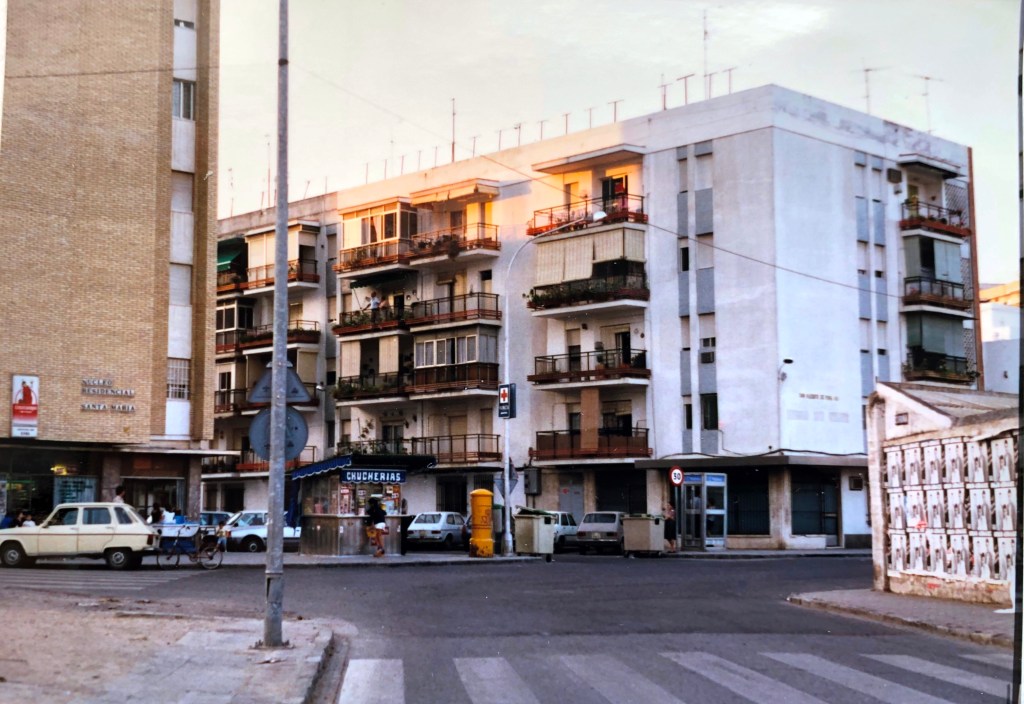
“Quien?” (who is it?) a gruff woman asked into the box.
The cab driver looked at me. All of the Spanish words I knew disappeared. I shrugged my shoulders and gave him a blank look.
“Quien?” the woman asked again, sounding more annoyed this time.
I finally remembered one helpful word — “estudiante” — and said it to the cab driver.
He said something to her. She said something to him. He said something else to her, and then he smiled at me and left.
An interminable ten minutes later, a short, sturdy-looking woman came down to the lobby where I was perseverating. Angelita, my Spanish “mother,” briskly introduced herself, grabbed my bag, and brought me upstairs in the elevator.
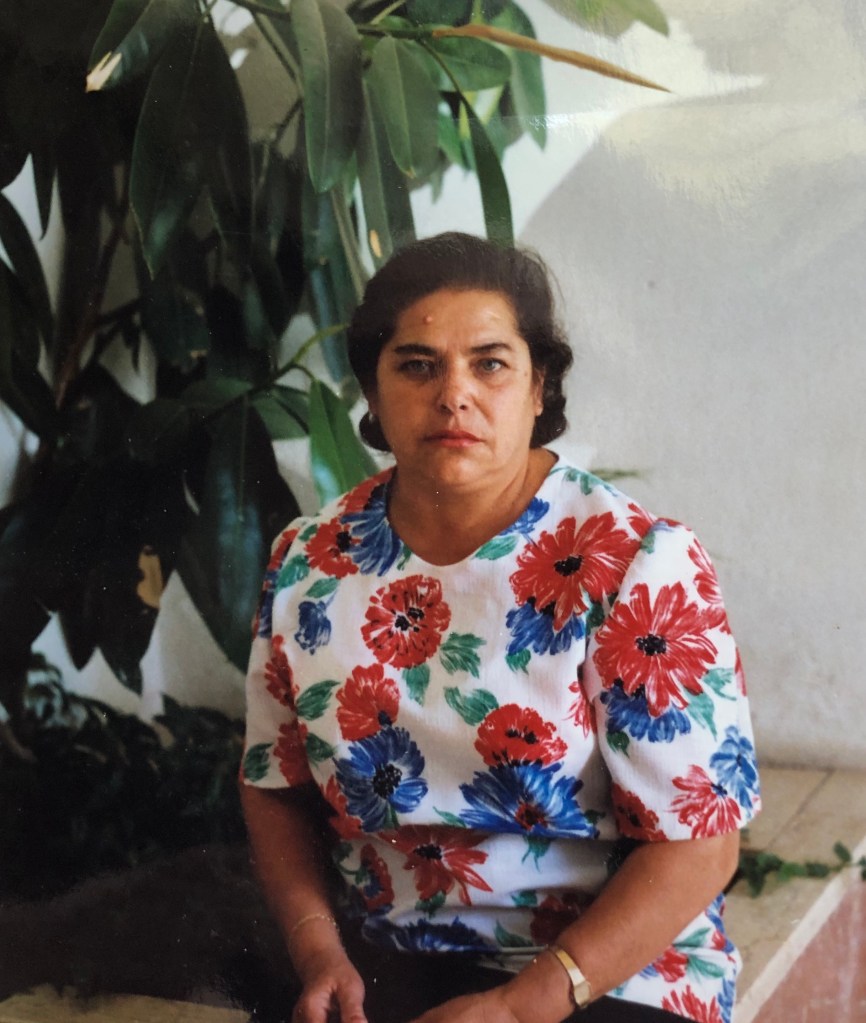
The apartment was a small two-bedroom place, with a galley kitchen, a formal living room that looked unused, and a little TV room.
I met Esperanza, my 15-year-old “sister,” and was shown to my room. Espe, as she was called, announced, in a manner that could never be confused with subtle, that I was taking over her room. I wondered where her father was, and where she would be staying.
After getting my bags settled, we sat down for a meal. Angelita served hot dogs, which completely surprised me. We eat hot dogs for a living in New York, I thought, but I had no idea they even had hot dogs in Spain! (Oh, Grasshopper, so much to discover …) I later found out that she had not been expecting me for another week and did not have much food in the refrigerator when I arrived. That explained her tone when she answered the buzzer.
As the evening went on, I kept expecting my host father to come home from work. Eventually I asked Angelita about him, and learned that he had been killed in a car accident the year before. The family had lived in Pamplona, in northern Spain, and after the accident she and Espe had moved to Seville, Angelita’s hometown.
I slowly pieced together that she had portrayed her family as husband, wife, and daughter to my study abroad program, perhaps in order to ensure that they would place a student with her. It was clear that she needed the stipend the program paid to host families. In a conversation we had about a month later, she told me that she wanted to host a student to be able to put food on the table for her daughter, even though it meant that she and Espe would share a bedroom.
The hot dogs and the difficult family circumstances were just two of the eye-opening experiences I had that semester. At 19, I had always lived in an enveloping cocoon of family and friends where there was always someone to turn to if a problem came up. Now, for the first time in my life, I was truly alone. My host family was cordial, but they were in a lot of pain themselves (I see now, looking back as an adult) and so they understandably tolerated more than embraced having me in their home.
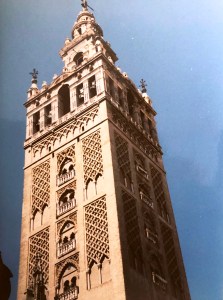
Over the course of the next four months, I got better at being on my own. Because it was often uncomfortable to be in the apartment, and because I was determined not to cling to American friends from my program, I started to learn how to fill my own days, especially on the weekends. It was a struggle at first.
One Sunday in particular stands out, where I had no plans and felt terribly homesick and lonely. I walked to one of my favorite spots, the Seville Cathedral, sat in the back, and cried. After a while, I felt better, took a deep breath, left the cathedral, and went to see other things in the city. I remember that being a pivotal moment. I acknowledged that I was hurting, realized it wasn’t the end of the world, and kept moving.
In addition to being in a number of situations that forced me to grow up a little, there were many other benefits to my time in Spain. I learned much more about Spanish culture than I would have if I were just a tourist. I went home from school for dinner and a rest every day from 2 – 5 p.m., then returned to school for an evening class and socializing with friends from my program. Many people joked that the pace of the siesta schedule was an indication of laziness, but I felt that the days and evenings unfolded in a way that allowed for a sweet balance between work and play.
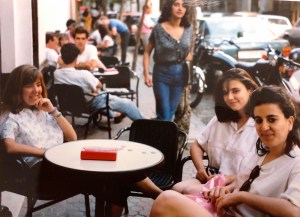
I obviously learned a lot about the Spanish language as well, at times by mixing up words. There was the time I told Angelita and Espe that I was pregnant when I was trying to say I was embarrassed. Turns out you can’t just put a vowel on the end of an English word and Spanish-ize it. Embarazada is not embarrassed. Another day I told them that my American friend was preparing a dinner of “polla” for her host family. When they keeled over laughing, I discovered an important distinction: “pollo” is chicken. “Polla” is slang for a part of the male anatomy that begins with d. Vowels are so important.
A highlight of the trip was a visit from my parents and sister. My dad and I still laugh about some of things that happened, like the time he and I were standing at a bar waiting for drinks and he helped himself to another man’s olives, thinking they were out for the taking like peanuts at an American bar. That gave me a chance to practice my most deferential vocabulary words. (“My sincerest apologies! My American father did not understand that those were yours!”)
Another day we traveled to the city of Granada and discovered when we arrived that the hotel my father had booked was closed for renovations. My dad kept insisting that someone named Pepe had taken his reservation over the phone, and the cab driver kept telling me “esta cerrado” (it’s closed). When we pulled up to the hotel, it was a pile of rubble. On to Plan B. My mom, whose only Spanish word was “hola,” wandered off while the rest of us were pulling our hair out and somehow got a recommendation for a hotel right down the street.

I was talking with a friend the other day about my semester in Spain and she asked if it was fun. I told her that there were many fun times and I have lots of fond memories, but when I think back, it was more a time of growth than fun. I left Spain a little more mature, a little more aware of the world around me, and a little more humble, and that was a good thing.
When I got home, I put together a scrapbook. This was the final page.

I love reading your writings and more importantly your is insights and feelings!
LikeLiked by 1 person
Thank you, Pittner! I appreciate your encouragement!
LikeLike
That’s the best review of study abroad that I have read. Great overview! You do well with humor; I can hear
you laughing as you retell parts. Great reflection. Wish I had had such an opportunity way back when.
LikeLiked by 1 person
Thank you, Dianne — that means a lot coming from a world traveler like you!
LikeLike
Wow – that brought back so many memories for me! I was an exchange student in Australia for my junior year of high school. The easiest part was I spoke the language…but living half way around the world with strangers when you are 16-17 really is a growth experience! Thanks for bringing it all back with such humor and wonderful perspective. Look forward to every one of your blogs!!
LikeLiked by 1 person
Thanks, my friend! As I recall, we had some similar experiences. You were way ahead of me, though, going in high school.
LikeLike